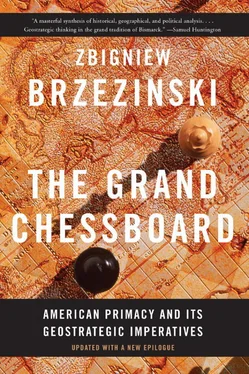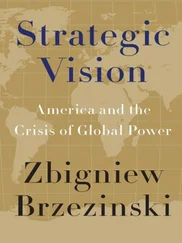In addition, one must consider as part of the American system the global web of specialized organizations, especially the “international” financial institutions. The International Monetary Fund (IMF) and the World Bank can be said to represent “global” interests, and their constituency may be construed as the world. In reality, however, they are heavily American dominated and their origins are traceable to American initiative, particularly the Bretton Woods Conference of 1944.
Unlike earlier empires, this vast and complex global system is not a hierarchical pyramid. Rather, America stands at the center of an interlocking universe, one in which power is exercised through continuous bargaining, dialogue, diffusion, and quest for formal consensus, even though that power originates ultimately from a single source, namely, Washington, D.C. And that is where the power game has to be played, and played according to America’s domestic rules. Perhaps the highest compliment that the world pays to the centrality of the democratic process in American global hegemony is the degree to which foreign countries are themselves drawn into the domestic American political bargaining. To the extent that they can, foreign governments strive to mobilize those Americans with whom they share a special ethnic or religious identity. Most foreign governments also employ American lobbyists to advance their case, especially in Congress, in addition to approximately one thousand special foreign interest groups registered as active in America’s capital. American ethnic communities also strive to influence U.S. foreign policy, with the Jewish, Greek, and Armenian lobbies standing out as the most effectively organized.
American supremacy has thus produced a new international order that not only replicates but institutionalizes abroad many of the features of the American system itself. Its basic features include
• a collective security system, including integrated command and forces (NATO, the U.S.-Japan Security Treaty, and so forth);
• regional economic cooperation (APEC, NAFTA [North American Free Trade Agreement]) and specialized global cooperative institutions (the World Bank, IMF, WTO [World Trade Organization]);
• procedures that emphasize consensual decision making, even if dominated by the United States;
• a preference for democratic membership within key alliances;
• a rudimentary global constitutional and judicial structure (ranging from the World Court to a special tribunal to try Bosnian war crimes).
Most of that system emerged during the Cold War, as part of America’s effort to contain its global rival, the Soviet Union. It was thus ready-made for global application, once that rival faltered and America emerged as the first and only global power. Its essence has been well encapsulated by the political scientist G. John Ikenberry:
It was hegemonic in the sense that it was centered around the United States and reflected American-styled political mechanisms and organizing principles. It was a liberal order in that it was legitimate and marked by reciprocal interactions. Europeans [one may also add, the Japanese] were able to reconstruct and integrate their societies and economies in ways that were congenial with American hegemony but also with room to experiment with their own autonomous and semi-independent political systems… The evolution of this complex system served to “domesticate” relations among the major Western states. There have been tense conflicts between these states from time to time, but the important point is that conflict has been contained within a deeply embedded, stable, and increasingly articulated political order…. The threat of war is off the table. [2]
Currently, this unprecedented American global hegemony has no rival. But will it remain unchallenged in the years to come?
CHAPTER 2
The Eurasian Chessboard

FOR AMERICA, THE CHIEF geopolitical prize is Eurasia. For half a millennium, world affairs were dominated by Eurasian powers and peoples who fought with one another for regional domination and reached out for global power. Now a non-Eurasian power is preeminent in Eurasia—and America’s global primacy is directly dependent on how long and how effectively its preponderance on the Eurasian continent is sustained.
Obviously, that condition is temporary. But its duration, and what follows it, is of critical importance not only to America’s well-being but more generally to international peace. The sudden emergence of the first and only global power has created a situation in which an equally quick end to its supremacy—either because of America’s withdrawal from the world or because of the sudden emergence of a successful rival—would produce massive international instability. In effect, it would prompt global anarchy. The Harvard political scientist Samuel P. Huntington is right in boldly asserting:
A world without U.S. primacy will be a world with more violence and disorder and less democracy and economic growth than a world where the United States continues to have more influence than any other country in shaping global affairs. The sustained international primacy of the United States is central to the welfare and security of Americans and to the future of freedom, democracy, open economies, and international order in the world. [1]
In that context, how America “manages” Eurasia is critical. Eurasia is the globe’s largest continent and is geopolitically axial. A power that dominates Eurasia would control two of the world’s three most advanced and economically productive regions. A mere glance at the map also suggests that control over Eurasia would almost automatically entail Africa’s subordination, rendering the Western Hemisphere and Oceania geopolitically peripheral to the world’s central continent (see map on page 32). About 75 percent of the world’s people live in Eurasia, and most of the world’s physical wealth is there as well, both in its enterprises and underneath its soil. Eurasia accounts for about 60 percent of the world’s GNP and about three-fourths of the world’s known energy resources (see tables on page 33).
Eurasia is also the location of most of the world’s politically assertive and dynamic states. After the United States, the next six largest economies and the next six biggest spenders on military weaponry are located in Eurasia. All but one of the world’s overt nuclear powers and all but one of the covert ones are located in Eurasia. The world’s two most populous aspirants to regional hegemony and global influence are Eurasian. All of the potential political and/or economic challengers to American primacy are Eurasian. Cumulatively, Eurasia’s power vastly overshadows America’s. Fortunately for America, Eurasia is too big to be politically one.
Eurasia is thus the chessboard on which the struggle for global primacy continues to be played. Although geostrategy—the strategic management of geopolitical interests—may be compared to chess, the somewhat oval-shaped Eurasian chessboard engages not just two but several players, each possessing differing amounts of power. The key players are located on the chessboard’s west, east, center, and south. Both the western and the eastern extremities of the chessboard contain densely populated regions, organized on relatively congested space into several powerful states. In the case of Eurasia’s small western periphery, American power is deployed directly on it. The far eastern mainland is the seat of an increasingly powerful and independent player, controlling an enormous population, while the territory of its energetic rival—confined on several nearby islands—and half of a small far-eastern peninsula provide a perch for American power.
Читать дальше













